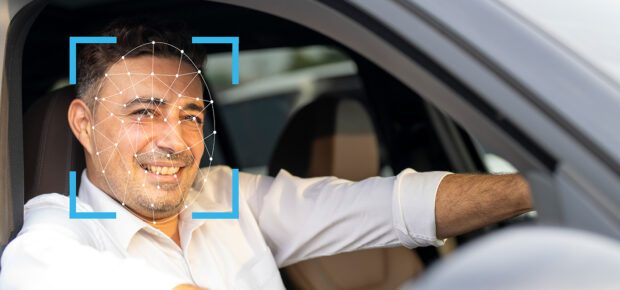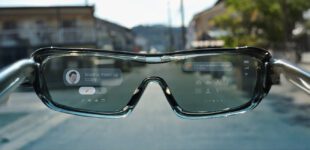March 21, 2024
Cars collect a lot of information — where you’ve been, how fast you drive, where you shop, and more. Modern driver monitoring systems go beyond that. Today’s vehicles monitor the behavior of the drivers themselves. For example, some cars can tell when drivers have taken their hands off the wheel. Cars with autonomous driving capabilities have internal cameras that detect when drivers have taken their eyes off the road. And some of that data may be collected and used by insurance companies.
Which raises questions. What, exactly, does your car know about you?
Looking Inward
The amount of data cars generate is staggering. A typical vehicle may have over 200 sensors generating 4TB of data. Those sensors include diagnostic data to monitor engine performance, and the perceptual systems used to sense whether a car is in the blind spot. Infotainment systems that connect can store information about the stores you visited, the routes you drove and the people you call.
Cars collect information about drivers and passengers through driver monitoring systems (DMS). They’ve been developed to reduce traffic accidents caused by distracted, impaired or drowsy driving. Increasingly some of the features of driver monitoring systems are required by regulators for new cars. Components of the system include:
- Driver-facing cameras to monitor driver attentiveness and fatigue
- Heart rate monitors installed in steering wheels, similar to those found on an exercise machine at the gym. That information can be used to determine fatigue levels through complicated algorithms
- Pressure sensors in seats and infrared devices can detect the number of people in the car. These systems can be used to remind parents not to leave children in the back seat
- Fingerprint sensors can be used to prevent unauthorized use
The tools and techniques used in DMS systems are fascinating, and there are many existing and emerging sensors and algorithms in this space. If you’d like an in-depth look at the state of these technologies, check out this article from IEEE Xplore.
Privacy and Security
IEEE Senior Member Euclides Chuma notes that some of the data collected by and DMS can be used to make inferences about you. And much of the concern comes from drivers worried about insurance rates, the data can be used for much more.
Cameras, he said, can be used to identify your body type. Heart rate monitoring can provide clues to your physical health and stress levels. Your musical preferences might reflect your mood. Identifying the number of people in a vehicle can indicate your level of sociability.
Much of this information, if it were made available, would be useful to marketers and advertisers to encourage people to spend impulsively.
“This raises ethical concerns about the extent to which technology can be employed for economic gains at the expense of an individual’s well-being,” Chuma said.
IEEE Member Ralf Ma said that ensuring the collection of personal data and information requires the cooperation of policymakers, car manufacturers, third-party certifiers and consumers.
“Policymakers need to determine what kind of data will be desensitized for use by automakers, what data cannot be used and can only be stored locally and what data must be confirmed by the consumer before it can be used,” Ma said. “There must be clear restrictions on the use of all data types.”
Experts note that there’s a lot of overlap between the type of information collected by cars and the type of information collected by smartphones, and that like smartphones, drivers often consent to the collection of data.
“Our personal driving data, the places we visit and image data during our driving can be collected by our car,” said IEEE Member Bilin Aksun-Guvenc, “The driver’s consent is required for any personally identifiable information like name and address. Even with consent, this information should not be made publicly available.”
Learn More: If you want a deeper dive into the potential privacy vulnerabilities found in one electric vehicle, check out this article from IEEE Xplore.





 Meaningful Momentum or Running in Place?
Meaningful Momentum or Running in Place? AI Through Our Ages
AI Through Our Ages Liquid Infrastructure: Our Planet's Most Precious Resource
Liquid Infrastructure: Our Planet's Most Precious Resource The Impact of Technology in 2025
The Impact of Technology in 2025 Quantum and AI: Safeguards or Threats to Cybersecurity?
Quantum and AI: Safeguards or Threats to Cybersecurity? Why AI Can't Live Without Us
Why AI Can't Live Without Us Bits, Bytes, Buildings and Bridges: Digital-Driven Infrastructure
Bits, Bytes, Buildings and Bridges: Digital-Driven Infrastructure Impact of Technology in 2024
Impact of Technology in 2024 Emerging AI Cybersecurity Challenges and Solutions
Emerging AI Cybersecurity Challenges and Solutions The Skies are Unlimited
The Skies are Unlimited Smart Cities 2030: How Tech is Reshaping Urbanscapes
Smart Cities 2030: How Tech is Reshaping Urbanscapes Impact of Technology 2023
Impact of Technology 2023 Cybersecurity for Life-Changing Innovations
Cybersecurity for Life-Changing Innovations Smarter Wearables Healthier Life
Smarter Wearables Healthier Life Infrastructure In Motion
Infrastructure In Motion The Impact of Tech in 2022 and Beyond
The Impact of Tech in 2022 and Beyond Cybersecurity, Technology and Protecting Our World
Cybersecurity, Technology and Protecting Our World How Technology Helps us Understand Our Health and Wellness
How Technology Helps us Understand Our Health and Wellness The Resilience of Humanity
The Resilience of Humanity Harnessing and Sustaining our Natural Resources
Harnessing and Sustaining our Natural Resources Creating Healthy Spaces Through Technology
Creating Healthy Spaces Through Technology Exceptional Infrastructure Challenges, Technology and Humanity
Exceptional Infrastructure Challenges, Technology and Humanity The Global Impact of IEEE's 802 Standards
The Global Impact of IEEE's 802 Standards Scenes of our Cyber Lives: The Security Threats and Technology Solutions Protecting Us
Scenes of our Cyber Lives: The Security Threats and Technology Solutions Protecting Us How Millennial Parents are Embracing Health and Wellness Technologies for Their Generation Alpha Kids
How Millennial Parents are Embracing Health and Wellness Technologies for Their Generation Alpha Kids Space Exploration, Technology and Our Lives
Space Exploration, Technology and Our Lives Global Innovation and the Environment
Global Innovation and the Environment How Technology, Privacy and Security are Changing Each Other (And Us)
How Technology, Privacy and Security are Changing Each Other (And Us) Find us in booth 31506, LVCC South Hall 3 and experience the Technology Moon Walk
Find us in booth 31506, LVCC South Hall 3 and experience the Technology Moon Walk Virtual and Mixed Reality
Virtual and Mixed Reality How Robots are Improving our Health
How Robots are Improving our Health IEEE Experts and the Robots They are Teaching
IEEE Experts and the Robots They are Teaching See how millennial parents around the world see AI impacting the lives of their tech-infused offspring
See how millennial parents around the world see AI impacting the lives of their tech-infused offspring Take the journey from farm to table and learn how IoT will help us reach the rising demand for food production
Take the journey from farm to table and learn how IoT will help us reach the rising demand for food production Watch technical experts discuss the latest cyber threats
Watch technical experts discuss the latest cyber threats Explore how researchers, teachers, explorers, healthcare and medical professionals use immersive technologies
Explore how researchers, teachers, explorers, healthcare and medical professionals use immersive technologies Follow the timeline to see how Generation AI will be impacted by technology
Follow the timeline to see how Generation AI will be impacted by technology Learn how your IoT data can be used by experiencing a day in a connected life
Learn how your IoT data can be used by experiencing a day in a connected life Listen to technical experts discuss the biggest security threats today
Listen to technical experts discuss the biggest security threats today See how tech has influenced and evolved with the Games
See how tech has influenced and evolved with the Games Enter our virtual home to explore the IoT (Internet of Things) technologies
Enter our virtual home to explore the IoT (Internet of Things) technologies Explore an interactive map showcasing exciting innovations in robotics
Explore an interactive map showcasing exciting innovations in robotics Interactively explore A.I. in recent Hollywood movies
Interactively explore A.I. in recent Hollywood movies Get immersed in technologies that will improve patients' lives
Get immersed in technologies that will improve patients' lives